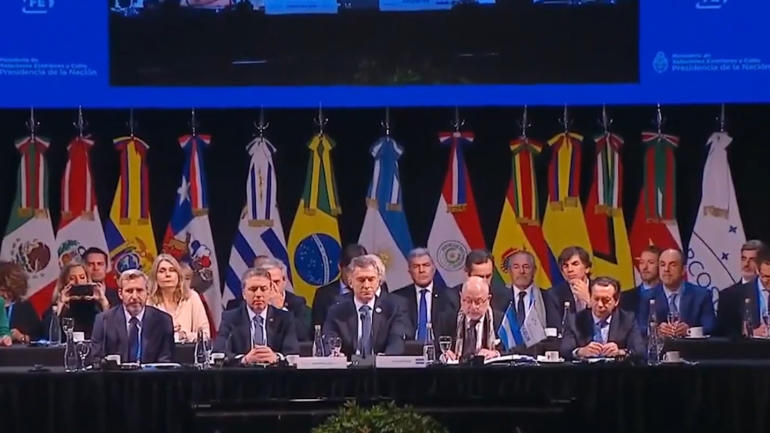Basking in the glow of reaching a free trade agreement with the European Union just last month, the South American economic bloc Mercosur ratified its commitment to opening up new markets on Wednesday.
“This is a clear sign to the world that we want Mercosur to be open, competitive, dynamic, committed to integration and trade, with clear rules on investment and for doing business,” said Argentina president Mauricio Macri.
Though Argentina championed this free trade agreement, following 20 years of negotiations, there’s still a question mark over the direction the country is headed – and over the pact itself.
CGTN’s Joel Richards report.
Argentina holds presidential elections in October, and Macri hopes this trade deal will boost a run for a second term.
This is a deal that provides countries like Argentina the opportunity to develop its potential in agricultural production.
Enrique Gonzalez Kees is one of the largest beef producers in the province of Santa Fe. He said the country is not ready to respond to a sudden increase in demand in exports, because of constantly shifting trade policies in Argentina.
“We all know that the rural sector and cattle-rearing in particular have long cycles. We have to think that we will be successful if there is continuity over the long term. If not, we will fail.”
Gonzalez Kees said the previous government’s policies hurt the agricultural sector and hopes Macri wins releection.
“If we continue with this government, I think the opportunities for the agricultural sector are phenomenal,” Kees said.
Yet, polls suggest Macri is running neck-and-neck against challenger Alberto Fernandez, whose vice presidential candidate is former President Cristina Kirchner. Fernandez has been critical of the terms of the free trade agreement with the EU and believes it will harm the labor market.
Union leader Ruben Cortina expects the opposition to try and renegotiate this deal if it wins the elections, which he would welcome.
“In Latin America, in general terms, the labor movement has always been against free trade agreements because they usually don’t take into account the asymmetries between both sides of the agreement,” Cortina said. “Big countries benefit more than small and peripheral countries like ours from these type of agreements.”
While there may be uncertainty on the political horizon in Argentina, Mercosur leaders took the opportunity to state their commitment to free trade. Brazil now takes over the presidency of the bloc and has said it will work toward reaching another free trade agreement – this one between Mercosur and the United States.
 CGTN America
CGTN America

